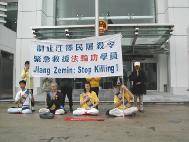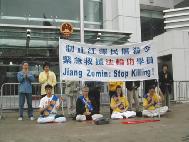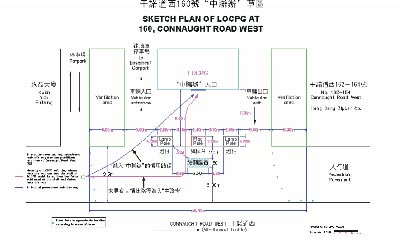香港警方诬告法轮功学员案辩方律师陈词全文(中英对照)(上)
另,香港学员将于每天开庭的时间(一般为上午9时半至下午4时半)每半小时密集发正念。
以下是香港警方诬告法轮功学员案辩方律师陈词全文。
香港警方诬告法轮功学员案辩方律师陈词全文(中英对照)(上)
HONG KONG SPECIAL ADMINISTRATIVE REGION
WSC 548 OF 2002
DEFENCE SUBMISSION
CHRONOLOGICAL HISTORY
在香港特别行政区西区裁判法院
WSC 548 OF 2002
辩方律师陈词
事发经过
1. At about 8.50 am on the 14th of March 2002 4 Swiss Fa Lun Gong (F.L.G.) practitioners set up a small stationary linear sit-in type demonstration in front of the flag podium of the Chinese Government Liaison Office at 160 Connaught Road West (no.160). By Hong Kong Standards, this pavement was very wide totally unobstructed and pedestrian traffic was very light. The demonstration included a hand held banner, a mat stating "Switzerland" and (like all things Swiss!) was extremely neat a tidy. The demonstration was "aimed at" the government of China and its positioning was "symbolically perfect" (i.e. directly opposite the flag podium of the government to whom the protest was directed). The "layout" can be fixed exactly on the scale plan exhibited. There was over 2 metres of clear pavement in all sides of the demonstration area. (2-3 metres on the office(s) side and 5 to 6 metres on the road (N.) side). The demonstrators had no reason to believe that they would embarrass or inconvenience anybody or anything except the conscience of the government against whose activities they were seeking to exercise the H.K. right to demonstrate. Early video and photos of this demo (prior to about 10.00 am) show it to have been colourful but quiet and that tranquillity, peace, calm, and order prevailed. However there was a buzz of official resentment and activity at no.160.
1. 在2002年3月14日,上午八点五十分左右,四名瑞士法轮功学员在干诺道西160号中央人民政府驻港联络办公室(160号)门前的旗杆台前细小范围内排坐成一行,进行静坐示威行动。根据香港的标准,这条人行道很宽阔,完全没有障碍物,而且行人往来量很少。这次的示威行动包括了一个手持的横额,一张地席写着“Switzerland(瑞士)”,(就像所有瑞士的东西都有“瑞士”字样),而且他们极之整齐。这次“示威行动”针对」中国政府,而请愿者选择的位置具“理想的象征意义”(就是直接对着抗议所针对的政府的旗杆台)。请愿者的“分布”可以精确地显示在所附按比例缩小的展示图。在请愿范围的四周都有超过两米阔、且无障碍的人行道(在靠中联办的一侧(南)有两至三米,在靠路(北)边有五至六米),除了他们这次在香港的请愿行动所针对的(中国)政府的良心之外,这些示威者没有理由相信他们会引起任何人物的尴尬和不便。早前有关这次示威行动的录影带和图片(上午十时之前)显示出这次行动富有色彩而又安静,笼罩着安宁、和平、冷静而有秩序的气氛。但官方的怨恨与行动带来的扰攘也在160号出现。
2. That "buzz" had begun with a security guard from no.160 taking the view that the demo. was too close to his podium. He was accustomed to the F.L.G. demos being tolerated and "penned in" only to one side outside no.162. During the next hour a named official from no.160 (who had been previously supplied with the private phone number of Mandarin speaking senior police) repeated his complaint to the local police on 5 separate occasions. Despite this show of concern, that official did not make a witness statement or give evidence to the court.
2. 这些“扰攘”始于160号护卫的意见,他认为这次请愿行动的地点太接近旗杆台。他只习惯于容忍法轮功的请愿行为被“拦到”162号外人行道的一旁。接着下来的一个小时,在160号的一位被指名的官方人员(他有警方早前所提供,能说普通话的高级警务人员的私人电话号码)重复向本地警方投诉了5次。即使是如此地关注事情,这位官员却没有做出证人声明或提供证据给法庭。
3. Just before 9.00 am the superintendent at Western Police Station received news of the official's complaint. The superintendent jumped to deal with this possible pavement obstruction. He shelved his routine 9.00 am Briefing and immediately rushed to the scene. By about 9.10 am there was a large number of police "milling about" outside no.160. The police numbers grew and grew until there were many more police than demonstrators.
3. 在上午差不多九点钟,西区警署的指挥官收到有关官员投诉的消息。这位指挥官立即出来处理这件可能阻碍人行道的案件。他搁下自己例行的九点钟训示会,立刻赶到现场。到了上午九时十分,160号外面已经有大量警察“来回打转”。警察的人数不断地增加直至到警察的人数比示威人士多出许多。
4. The police embarked on a serious of potentially confrontational and puzzling acts. First they blocked off the pavement access to the podium with iron railings (this was the very access, so it is said, that workers and visitors to 160 liked to use; now only the "dangerous" vehicular access could be used). They than "penned in" the demonstrators to E and West. Then they "penned back" the media and curious citizens to the E leaving a 1-2 metre gap of pavement next to the road for passers by; later they put a similar barrier to the West (at the border of 160 and 162).
4. 警察展开了一连串带对抗性和令人费解的行为。首先,他们用铁马封锁了通往旗杆台的人行道(这就是那条据说员工和访客到160号时喜欢使用的通道;现在遭封锁后,只有那条“危险”的行车道可供使用)。然后他们把示威者在东、西两边“拦住”,接着他们把传媒和好奇的市民“拦到”东边,在路边留下1-2米宽的间隙让人行通过;其后,他们在西边(在160和162的交界处)也放置了铁马。
5.The superintendent addressed the press and media. They could only listen by standing in the E vehicular access to no.160. The police spoke to the foreign demonstrators. They cooperated by showing their Swiss passports. All their passports and visas were in order. Never-the-less and for no apparent reason (their being no "black-list" of F.L.G. in H.K.) the police wrote down particulars from their passports. The police realized they were foreigners but did not ask them what their native language was. Although this had not been asked, an interpreter was brought to the scene by the police (in the presence of the media). The police then discovered that the interpreter did not speak the language of the foreign demonstrators. They continued to use this interpreter (again in the presence of the media) despite their knowledge that she did not speak the language of these foreigners.
5. 那位指挥官向记者和传媒发表讲话,他们只能在160号东边的车辆入口旁站着聆听。警察跟外国的示威者说话。他们(外国的示威者)合作地出示他们的瑞士护照。他们全部的护照和签证都是有效的。不过在没有明确的原因下(在香港没有法轮功的“黑名单”的情况下),警察抄录了他们护照上的资料。警察知道他们是外国人,但却没有询问他们的母语是什么。虽然警察没有询问请愿者以上的问题,但他们(在传媒面前)把一位翻译员带到现场。警察随即发现翻译员使用的并不是这些外国示威人士的语言。即使如此,他们继续使用这位翻译员(同样是在传媒面前)。
6. The police then embarked on a series of legally puzzling quasi-RIOT ACT type readings out to the demonstrators. The readings contained a threat, that further action (eventually removal and arrest) may be taken, and an inducement, that this may be avoided if the demonstrators moved to outside 162. School teachers might describe this as giving naughty pupils several "last chances" but in the grown up world, these "warnings" have little legal basis, they were "interpreted" in the wrong language, and this all went on in front of the media. The foreign demonstrators reacted by pointing out that they were causing no obstruction and were doing nothing wrong and would not move. This is all in the police video/audio tapes.
6. 接着警方向示威人士展开了一连串在法律上令人费解,类似暴动法例式的宣读。这些宣读带有一个恐吓,就是可能采取进一步行动(最终被搬走和拘捕),和一个诱惑,就是如果这些示威人士移到162号外面,可避免警方的行动。学校老师们可能会形容这是给调皮学生们的数次“最后机会”。但在成年人的世界里,这些“警告”欠缺法律基础,且被“翻译”成错用的语言,而所有这些都在传媒面前发生。那些外国示威者指出他们没有造成阻碍,没有做错任何事,所以不会离开。所有过程都记录在警方的录影/录音带中。
7. By 12.30 pm massive numbers of police (including P.T.U. units) had been stood by. The tranquillity, space and peace which had prevailed before the arrival of large number of police had been replaced by metal barricades, police press conferences, police vehicles (some on the pavement), 2 police video teams with step ladders etc. All this reactive activity should have amazed the foreign visitors. We hope "over policing" of small matters is not becoming a feature of H.K. life. The visitors kept quiet and sat tight. At about 1.10 pm they and their local supporters, were seized using a technique which relies on causing pain to release a demonstrators grip. No formal cautions and no NTPIC were ever given to the suspects. They resisted being seized, said they had obstructed nobody, and said they should not be arrested.
7. 到了中午十二点半,大批警员(包括机动部队)都准备就绪。在大批警员未到场前那种安静、空间感与和平的气氛,已被铁马、警方的记者招待会、警车(部分停泊在人行道上)、两组携带踏脚梯的警方摄录队等所取代。所有这些反应的行动肯定会让外国访客感到惊讶。我们希望“警方的小题大做”不会成为未来香港生活的一个特征。那些访客保持冷静并且紧密地坐着。大约到了下午一时十分,他们和他们的本地支持者被警方采用使示威者感到疼痛而松手的方法抓捕,而警方没有给嫌犯正式的警告或正式的拘捕令。示威者抗拒警方抓捕,指出他们并没有阻碍任何人,以及他们不应该被拘捕。
SIGNIFICANT FACTORS
重要因素
8. To discover the true factors precipitating the seizure of so many peaceful people of good character, the overall history and political background of this particular area of pavement must be carefully examined. The government have demonstrably recognized the relevance of this complex background. The government has seen fit to instruct 2 very senior government Counsel to present their case. They (like defence counsel) have virtually no professional experience of doing pavement obstruction cases. They must be here for other reasons. We hope it is solely because there is an obvious and relevant political and constitutional aspect to this case. F.L.G. is unlawful in Mainland China. Any police force of a separate system but of the "same country" will naturally be tempted to react negatively to F.L.G. exercising a legal right to demonstrate here (in the face of the mainland office) which would be illegal in the mainland. Asian people (particularly those with reduced democracy) do feel uncomfortable in the presence of a direct visible challenge to authority. H.K. police have got into the (bad?) habit of placing humiliating cage like metal fences around peaceful sitting demonstrators (see S.C.M.P. 2/7/02). None of our constitutional documents suggests that free expression must be made from a quasi-caged and humiliating position.
8. 我们要仔细探讨中联办门外人行道的政治背景及整个历史,才能发现致使这众多品格优良的和平人士被拘捕的真正原因。这个政府亦展现出他们承认这个复杂背景的相关性,政府认为委派两名很资深的检控官去打这场官司的决定是合适的,他们(就像辩方律师)实际上没有处理过阻街案件的专业经验,他们到来一定是另有原因。我们认为政府的决定,主要是因为本案明显地触及政治和宪制这两个方面。法轮功在中国大陆是“不合法”的,一个属于“同一国家”但有另外体制的地方的警方,对法轮功在香港行使法律赋予的权利(当着大陆办公室的面)示威这种在中国大陆被视为“非法”的举动,自然地会被诱使对法轮功作出负面反应。亚洲人(尤其是那些没有享受太多民主的人)面对向当权者作出的直接及公然的挑战都会感到不自在。香港警方已经养成把类似带侮辱性的铁栏之类的牢笼围住和平静坐的示威者的(坏?)习惯(见S.C.M.P.2/7/020)。在我们任何一份宪制文件上,都没有指出自由表达意见一定要在类似牢笼和受屈辱的状态下进行。
9. The developed, obliging and immediate police response to official complaints from no.160 has a direct relevance to this case. The police have not troubled to bring a single "obstructed" witness to court. They have not produced a single truly "independent bystander". This is dangerously arrogant. The police know how highly such a witness would be regarded by the court when it comes to proving an inherently controversial offence which was flatly denied at the time by the defendants. The police may be hoping that the political climate re F.L.G. is such that the court will automatically accept whatever the police say and they the police need not trouble to produce independent confirmation.
9. 警方对160号发出的官方投诉,所形成的服从式而即刻的回应,与本案直接相关。警方完全无意传召任何“受到阻碍”的证人出庭,他们没有提供任何一个真正“独立的旁观者”,这是危险地自大的态度。警方知道在证实一个被辩方当场断然否定的本质上具争议性的指控,法庭会高度重视这一类证人。警方也许希望围绕着法轮功的政治气候已足够让法庭自动地接受他们的任何说法,警方因此不需要大费周章去提供独立的证词。
10. Those who serve in an authoritarian structure (e.g. police, security offices etc.) are inevitably susceptible to the mind set encapsulated in the Confucian parable about a despot who tested the loyalty of his subjects by pointing to a deer and calling it a horse; his people were not minded to contradict him even through everyone knew it was a deer that their leader was pointing to. Of course, the line between a demo. that may cause obstruction and one that may not is much finer than that between a horse and a deer. However these officers are likely to be pre-disposed to see any F.L.G. demonstration not previously tolerated/located by police as a potential obstruction. However it is hard evidence/and not the opinion of police officers, (however senior), which must satisfy the court. There is some arrogance in presenting this case involving a right to demonstrate without troubling to obtain any independent evidence from ordinary citizens. The police, like all other citizens are entitled to their own opinions privately held. Their subjective beliefs that this demo. constituted a potential obstruction has not been shown to have been based on reasonable grounds by any objective evidence. All the evidence has come from police and security men from 160. This creates an obvious appearance of bias.
10. 儒家的寓言中有一个故事是关于一个暴君为了检验随从对他的忠诚,于是指鹿为马,虽然随从们每个人都知道他们的领袖指着的是一只鹿,但他们并没有异议。而那些在极权架构内服务的人(如警察、安全人员等)无可避免地容易堕入故事中随从的思想倾向。当然衡量一个示威行动会否造成阻碍的界线,比分辨一只马和一只鹿要更为细致。然而,这些人员容易先入为主地将任何未经警方容许或指定位置的法轮功示威视为潜在的阻碍。但是,法庭需要的是真凭实据,而不是警员(无论多高级)的意见。在本案聆讯中,涉及到请愿权利时,控方有点自负,完全无意提供来自普通市民的独立证词。就像其他公民一样,警员有权拥有他们个人私自的意见。他们认为这次示威行动造成潜在阻碍的主观看法,并不是根据任何客观证据所得出的合理结论。所有的证据都是来自警察和160号的护卫员,这造成了明显偏见的表现。
11. The result of this police altitude is that/apart from the irrelevant opinions of police officers e.g. an F.L.G. might trespass, there might be a breach of the peace, approaching workers might be intimidated, there might be recurrence) there is no area of the potentially opinionated live witness evidence of potential obstruction that is not completely destroyed by the mathematical accuracy available from the scale plan, the 4 hours plus of video/audio material and the photographs illustrating the history of that stretch of pavement. The prosecution are now faced with (a) a wide lightly travelled pavement whose history shows flexible tolerance of acceptable clutter and whose future shows no police objection to a very substantial narrowing of the existing pavement. (b) photos and early videos which show that the flag podium was never "blocked" by the demonstrators. (scale plan proves this).
The result is that the prosecution have (towards the end of their case) been asking witnesses if the demonstrators might have obstructed persons who take straight line routes on H.K. pavements! They have recognised that without that proposition, they have no case. Such a mythical person, if he ever existed, (the "straight liner") would not survive long in H.K.
11. 警员这种态度的结果(除了警员作出多个不相干的意见,例如一个法轮功学员可能擅自进入;可能会破坏和平;走近的员工可能感受到威胁;同样事情可能会再次发生),使得可能是预先商定的目击证人所提供的潜在阻街的证据的每个方面,都彻底地被比例平面图所提供的精确数字、超过四个小时的影音证物以及表现这一段行人路的历史的图片一一推翻。控方现在面对以下两点:(a)一条宽阔且人流稀少的人行道,其过去对可接受的杂物表现灵活的容忍度,其未来则显示警方没有就这条人行道被大幅度收窄而提出反对;(b)图片和早先的录影带显示出旗杆台并未被示威者“阻塞”(比例图证明了这一点)。
结果,控方(在陈述案件接近尾声时)要向证人询问,示威者会否对在香港行人路上想走直线的人造成阻碍!他们知道要是没有这个论点,他们的诉讼就不成立了,这个神话式的人物(那个“走直线的人”),如果真的存在的话,不会在香港生存得很久。
12. This proposition cannot survive critical analysis in a H.K. setting. Some examples make the point. Among those we encounter on a regular basis are workmen unloading or piling goods on the pavement; enthusiastic volunteers seeking flag day donations; part-time workers distributing leaflets to persuade us to patronize a new restaurant or to entice us to purchase consumer items; a group of old friends whose chance encounter develops into a twenty-minute conversation right in the middle of the pavement. H.K. is still humane enough to tolerate, for periods of up to 12 hours, established "prostrate beggar positions" on the pavement necessitating pedestrian diversions in busy locations. Cake workers stop in mid-pavement with a banner to protest a loss of jobs. Teenage girls gather to gossip on the pavement whilst waiting for a friend who is 1 hour late. These last few weeks hundreds, sometimes, thousands of Hong Kong resident stood or sat on pavements watching world cup games on large video screens, blocking not just part, but frequently the whole, of the pavement. But understanding residents of this modern metropolis did not insist on walking in straight lines or even their "usual" route, they made small diversions around the groups of people or took an alternative route. The (usually) young "soon to be marrieds" set up semi-permantly on the pavement at L.G.4. We do not send for the P.T.U. We smile and pass by.
12. 这个论点在香港的环境里不能抵御严谨的分析,一些例子已证实了这一点。我们日常接触到的例子,如工人在人行道上起卸和堆放货物、热心的志愿工作者在卖旗日向行人卖旗、兼职者派发传单游说行人光顾一间新的酒楼或吸引行人去买消费品、一群老朋友在人行道上偶遇演变成二十分钟的街头对话。香港到现在仍然会基于人道,容忍有人在可以导致行人必须绕道而走的情况下,在不超过十二小时的期限内,在繁忙的人行道上维持一个“乞丐俯卧的姿势”。饼店工人停在路中心,打着横幅抗议失业。少女们在路上一边谈天,一边等待迟到了一个小时的朋友。最近的几个星期,成百上千的香港市民站在或坐在行人路上,观看大银幕上的世界杯比赛,他们很多时候阻塞的不只是部份人行道,而是整条人行道。但这个现代都市通情达理的居民,并没有坚持要走直线或者是维持他们“惯常”的路线,他们绕过了人群,或采用另外路线。对于那些“好事近”的(通常是)年轻人,在L.G.4的行人路上半永久摆设,我们不会派出机动部队,我们会带着微笑地经过。
13. Yet none of the persons in these few examples are protected by the Basic Law and International Covenants. The accused in this trial should be able to rely not only on the good will and courtesy of the residents of this civilized city that strives to be a world class metropolis; These accused have rights that are enshrined in and thus protected by the Basic Law, which guarantees their right to assemble and express their views, even if someone might have to make a very slight detour when walking on the pavement. Moreover in this case there is no evidence from anyone stating that he or she actually had to take a few extra steps. The difference between the examples and this case is that F.L.G. had a "political" message and they were not given the pavement tolerance they are entitled to. The "face" of no.160, the local police and their need to appear to be in control has affected their judgment.
13. 但以上几个例子中所涉及的人们,都是没有受到基本法和国际公约所保护的。而本次审讯被指控的人,不单可以倚赖来自这个争取成为世界级大都会的文明社会中人民的善意与礼待;即使有人可能在路过这条人行道时,需要作出轻微的绕道,这些被指控的人所拥有的权利是被高高列在基本法中,因此受到基本法的保护,保证他们的集会权利与表达意见的权利。并且,在本案中亦没有任何人提出任何证据,表示他/她确实因为避开这些请愿者而多走几步路。以上列举的例子与本案的分别,在于法轮功带有的“政治”信息,与及他们没有被给予应有的使用人行道的宽容度。由于160号的“面子”、本地警察的“面子”与其需要表现得对一切事情都在掌握中等因素,都在影响着他们的判断。
14. Hong Kong residents are accustomed to demonstrations sometimes disrupting the normal flow of traffic. They walk around a demonstration site and sometimes wait for the participants of a demonstration to walk by. Because the right to freedom of expression and the freedom of speech and the right to demonstrate are longstanding rights in H.K. Law, residents here have never been intimidated by peaceful demonstrations. The police had no need to attempt to divert and side track this small demonstration to a place on the same pavement but less conspicuous to those they wished to demonstrate to (i.e. 162). Had some implicit but unexpressed arrangement been come to between the police and the complainant at 160? The confusing events of 25/8/01 and 10/11/01 could be thus explained. Was there something sacrosanct about the big wide empty pavement outside 160? Why was the simple solution of "unblocking" the perceived blockage to the podium not dealt with by asking the Swiss to move 2 or 3 metres further away from the podium? Small wonder that the F.L.G. felt persecuted.
14. 香港市民已经习惯于示威活动可能有时会影响到正常的交通运作的情况。他们绕过示威地点,有时也会等待这些示威的参与者路过。因为表达自由、言论自由的权利以及请愿权利都是一些长久以来在香港法律下所保障的权利,这里的居民从来都没有对和平示威活动感到受威胁。警方没有必要尝试去把这次的小型示威转移到同一条人行道另一处的地方(也就是162),好让被抗议的人看来不太显眼。警方和160号的投诉者之间,有没有一些不成文的隐密安排?这样2001年8月25日与11月1日的混乱事件就可以得到解释。在中联办门前的一片宽阔无阻人行道上,是否有着神圣不可侵犯的意味?其实要“除去”旗杆台前所觉察到的障碍很简单,只需要要求那些瑞士人进一步移离旗杆台2至3米便行,为什么有一个这么简单的办法却不采用?难怪法轮功感到被迫害。
15. Somehow in this case, although it must now be acknowledged that there was plenty of space to pass in front of, behind and on either side of the four Swiss demonstrators and those F.L.G. members who supported them, the prosecution now insist that there was an obstruction because it was theoretically impossible for some hypothetical person to walk along the pavement to a position directly in front of the small group of protestors (occupying a site about 3 meters by 2 meters of a section of pavement measuring overall 30 meters by 9.5 meters) and then make a right angle turn so that they could walk as close as possible to the flag pole directly to the front door of the LOPCG.
15. 虽则在本案中,现在必须承认在这四名瑞士示威者和那些支持他们的法轮功学员的四周,都有大量的空间可以让行人通过,控方现在仍坚持说这是一个阻碍,因为在理论上一些假设的人士是不可能沿着人行道一直走到这小撮抗议者跟前(他们在一条30米长9.5米宽的人行道上,只是占用了一处3米长2米宽的地方),然后再作直角转向,好让他们最大限度贴近正对着中联办前门的旗杆台。
16. The absurdity of this proposition was illustrated by the prosecutor re-examining a witness to ask if, for a person emerging for his lunch break, the shortest and straightest route to the pavement would be through the flag podium. This is cloud cuckoo land because
(1)all normal lunch goers use the Des Voeux Road exit.
(2)to attempt to cross Connaught Road opposite the podium is unlawful.
(3)It is a no stopping area (cannot get taxi etc).
(4)It is not a direct route to anywhere (except to an empty piece of pavement).
(5)No normal lunch goer would come out just to visit an empty piece of pavement. All must go East or West to get anywhere and in fact, demonstrably, they do use the E or W entrances.
Even if such an odd fellow existed he could go through the podium and could still pass by either side of the demonstration. (9 foot plus 9AP) This "odd fellow" or even a legion of them cannot begin to establish a prima facie care of obstruction. In fact, no such witness was called. Perhaps he does not exist.
16. 这个论点的荒谬处可以从检控官再次盘问证人时,所问的问题中显示出来。检控官问道,如果有人要出去吃中午饭,最短和最直接的途径就是通过旗杆台。这是子虚乌有,因为:
1.所有正常去用午餐的人都会用德辅道的出口。
2.尝试穿越在旗杆台对面的干诺道是违法的。
3.这里没有停候处(不能上下的士等)。
4.这不是通往任何一处的直接路线(除了通往一段空无一物的人行道之外)。
5.没有任何一个正常的去用午餐的人走出来仅仅为的是看一段空无一物的人行道。无论到哪里去,所有人都必须向东面或西面走,而实际上,可以看到他们也用东面或西面的入口。
即使会有一个行为如此怪异的人存在,他仍然可以通过旗杆台,再从请愿范围(9英尺加9AP)的两旁的任何一侧走过。这个“怪异的人”或者甚至是一大批这种人存在,都不能够令阻碍的表面证据成立。实际上,并没有这类证人被传召;或许他并不存在。
(上,待续)

图一:请愿学员并没有阻塞任何通道。





